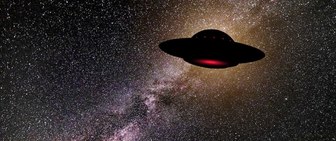A new survey shows that more US adults acknowledge the possibility of alien life than doubt its existence
TWITTER FOLLOW
Last week, NASA announced the discovery of seven Earth-sized planets orbiting the dwarf star TRAPPIST-1, just 40 light-years away. According to astronomers, three of these newly found planets are located within the habitable zone, also known as the "Goldilocks Zone." This finding suggests that one or more planets might contain liquid water — critical to supporting the evolution of life.
A recent YouGov poll shows that 40% of Americans think the planets likely contain some form of extra-terrestrial life, while only 16% think they probably don't.
Although the majority of US adults are unsure how a hypothetical exchange with an advanced alien species might turn out, 29% think that our distant neighbors would be friendly. Only 19% said they would expect an alien species to be hostile toward humanity.
When asked to explain why humans have yet to discover or be discovered by an alien species, 24% of respondents said alien life is too far away in space or time, while 15% indicated that human technology isn't advanced enough yet. A meager 17% said it's because alien life is either rare or non-existent.
At 12%, a not insignificant amount of US adults believe contact has already been made, but the US government is hiding this fact. To that end, the majority of people also think the government is more likely to keep news of extra-terrestrial contact secret, rather than disclose this information to the public.
While the question of alien life remains open, the groundbreaking news of seven Earth-sized planets has stirred optimistic opinions about the possibilities ahead. As Thomas Zurbuchen, an associate administrator at NASA, put it: "The discovery gives us a hint that finding a second Earth is not just a matter of if, but when."









